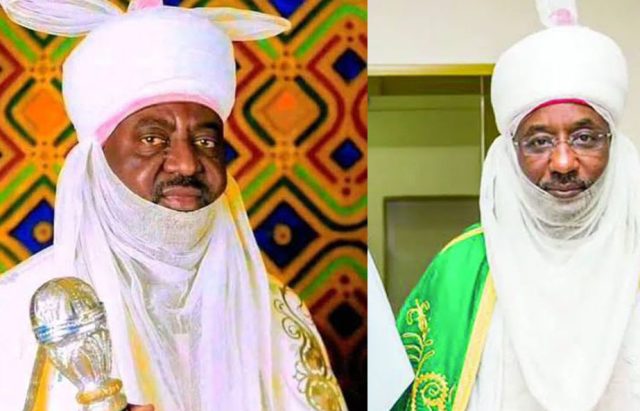The attempted disruption, by sponsored thugs, of the recent Fanisau annual Sallah durbar procession organised by the Kano Emirate was not an isolated occurrence. It fits into a broader and deeply troubling pattern of political violence with roots traceable to the deposition of Emir of Kano, Emir Aminu Ado Bayero. The public call by a key figure who prides himself as a close associate of Aminu Ado Bayero, signals a new and dangerous escalation.
He called on thugs via his Facebook page to gather at Emir Aminu Ado’s Bayero’s Mandawari residence, strategically located along the Emir’s anticipated return route. That Emir Sanusi was forced to reroute the procession to avoid potential bloodshed highlights the gravity of the threat.
The brazen and shameful confrontation that happened at Gidan Rumfa reflects a well-worn tactic of engineered provocation seen during the attempted disruption of the Sallah durbar procession. Then too, it was not a spontaneous act but part of a broader pattern that now appears to be escalating in both frequency and boldness.
Just as the public call for thugs to gather at the Mandawari residence along the Emir’s route, the decision by Emir Aminu Ado Bayero to deliberately pass in front of the palace, accompanied by chants, threats, and reported vandalism, was widely interpreted as a calculated affront to the authority of the Emirate. While it is good that Emir Aminu paid a condolence visit to Hajiya Mariya Sanusi Dantata over the death of Alhaji Aminu Dantata, any other route should have been ideal.
As if what they did in Gidan Rumfa was not enough, witnesses confirmed that all banners bearing the image of the Executive Governor of Kano along the state road were torn down or destroyed by the thugs in his entourage. These acts, carried out in broad daylight and with apparent coordination, point not only to contempt for Emir Sanusi, but also to a direct challenge to the authority of the Kano State Government.
That such provocations continue to target symbols of both traditional and state power reinforces concerns about a sustained and deliberate campaign to undermine the authority of the Kano State government, and MS II as Emir of Kano.
It is widely alleged that nearly 300 thugs were brought into Kano from Jigawa during the Hawan Fanisau incidence, underscoring the growing anxiety over the intent behind the provocation and the forces supporting it. At the very least, they point to a calculated attempt to destabilise the Emirate and challenge the authority of the Kano State government.
The escalation of rhetoric and physical provocation suggests a shift in strategy—one increasingly reliant on intimidation and orchestrated violence. This strategy did not emerge in a vacuum, it reflects the growing influence of actors within a camp, whose reputation for violence and thuggery is well known. To put it simply, at the heart of the escalation is a convergence of self-interested motives.
In 1981, following the decision of the Abubakar Rimi-led government to query the then Emir Ado Bayero, several accounts from that period named a close ally of the emir as a prominent figure in the violent mob that descended on the residence of Dr Bala Muhammad, the governor’s Special Adviser on Political Affairs. The house was set ablase, and Bala was killed. While no conviction was ever secured, the figure’s name has remained tied to public memory of the tragedy. His alleged involvement in other violent episodes—including the unresolved killings of businessman Alhaji Hassan Director and the wife of Governor Rimi—has continued to surface in conversations about Kano’s darker political chapters.
The attempted ambush against the durbar procession mirrors past tactics of provocation and targeted aggression. The subsequent attack on Sarkin Busar Kano, famous for his satirical attacks against adversaries of Emir Sanusi, and his entourage only reinforces the point that this is no longer merely a struggle over titles. It is a coordinated return to violence, with disturbing echoes from the past, now emboldened by the silence, or perhaps the protection, of the federal government and its security apparatus. Sarkin Busa’s only “crime” was openly hailing Emir Sanusi II and deriding his opponents, in the exact manner his forebears did in similar moments of dynastic contestation.
That the current campaign for legitimacy seems driven by this class of desperate actors is not merely unfortunate, it is alarming. That these men are central to the strategy, public messaging, and street-level operations is worrying. To ignore their history and present actions is to deliberately blind oneself to the stakes. Worse, the federal government watches this escalation unfold and chose not to act.
The security apparatus while visibly supporting Emir Aminu Ado Bayero, have remained unmoved in the face of open incitement, threats to life, and direct attacks on palace officials. There is no excuse for this selectivity. What is happening is a desecration of law and tradition, and the failure to hold its perpetrators accountable only emboldens them further.
Kano stands at a crossroads. This is not simply about royal succession. It is about whether violence and criminal impunity will once again take root under the guise of tradition. If those with the power to speak and act remain silent, they too will be judged complicit in the unraveling of one of West Africa’s oldest and most dignified institutions.
Wudil can be reached via: [email protected]







